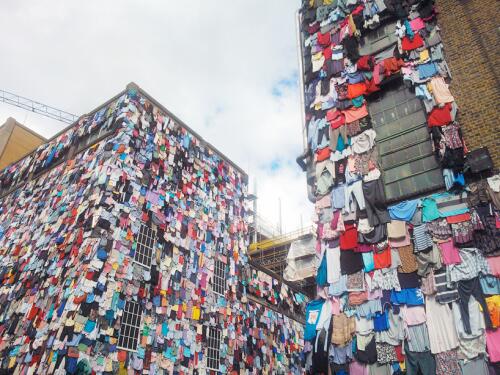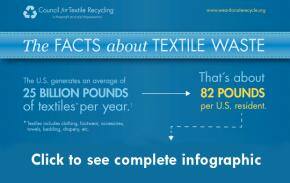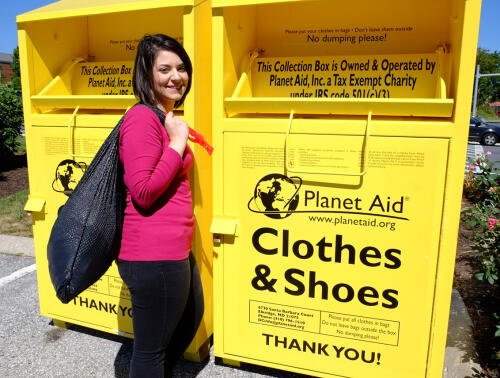It's not every day that you encounter a chef standing atop a seven-ton pile of clothing in the middle of a shopping mall, shouting at people through a megaphone to reduce waste. But Hugh Fearnley-Whittingstall is not just a chef. He is the brazen resource-saving warrior starring in the new BBC series, "Hugh's War on Waste."
"These are good clothes being binned as rubbish, not given to charity or recycled."
They often do things a little differently "across the pond," and Mr. Fearnley-Whittingstall is the new standard bearer in the tradition of British eccentricity. He became mobilized to fight food waste in the restaurant business long ago, and his new series on the BBC has helped broaden his campaign against wastefulness across many fronts.
Textile waste is among his newer targets, and the seven tons of used clothing in the London shopping mall represents the amount Brits throw away every ten minutes. "These are good clothes being binned as rubbish, not given to charity or recycled," writes Fearnley-Whittingstall in an article appearing in RadioTimes. "Charity shops and clothes banks are happy to take the lot - every stitch of them, whatever their condition. Yet 50,000 of these piles, a staggering 500 million individual garments, are being consigned to landfill or incinerated every year."
 This isn't the first time the problem of textile waste in the UK has been brought to light in such a dramatic way. In 2012 British department store Marks & Spencer encouraged customers to recycle clothing, and drew attention to their campaign by completely covering the outer walls of an old warehouse with used clothing (pictured right).
This isn't the first time the problem of textile waste in the UK has been brought to light in such a dramatic way. In 2012 British department store Marks & Spencer encouraged customers to recycle clothing, and drew attention to their campaign by completely covering the outer walls of an old warehouse with used clothing (pictured right).
Is the UK Leading?
So with all the dramatic hub-bub about reducing textile waste, are the Brits actually winning the war? The answer is: yes.
 The U.K. still sends about 392,000 U.S. tons of textiles to the landfill each year. But that is but a fraction of the amount thrown away on this side of the pond. By comparison, Americans send 10.5 million tons to the landfill (21 billion pounds), a figure 27 times larger than that of the Brits, which is phenomenal when you consider the U.S. population is only five times larger than that of the U.K.
The U.K. still sends about 392,000 U.S. tons of textiles to the landfill each year. But that is but a fraction of the amount thrown away on this side of the pond. By comparison, Americans send 10.5 million tons to the landfill (21 billion pounds), a figure 27 times larger than that of the Brits, which is phenomenal when you consider the U.S. population is only five times larger than that of the U.K.
Mellow Yellow
 Planet Aid hasn't done anything nearly as loud or dramatic as Fearnley-Whittingstall to broadcast the message about textile recycling and the need to reduce waste. But it is true that our shiny yellow bins are quite striking and have become a recognizable hallmark for clothing and shoe recycling across the States.
Planet Aid hasn't done anything nearly as loud or dramatic as Fearnley-Whittingstall to broadcast the message about textile recycling and the need to reduce waste. But it is true that our shiny yellow bins are quite striking and have become a recognizable hallmark for clothing and shoe recycling across the States.
We are proud of that accomplishment, but we need to do more to make it even more convenient for people to recycle, and to help them understand why it is so important to do so. We join with other charities in this effort, and hope that together we can save perfectly usable clothing from becoming, as Mr. Fearnley-Whittingstall would say, mere rubbish.
